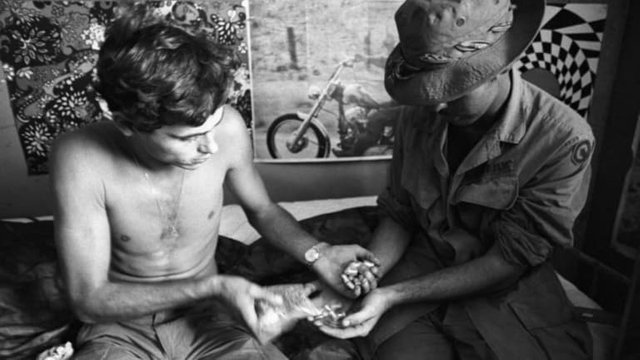
For decades, heroin was seen as the worst drug out there -- instantly and permanently addictive, leading to a desire so insatiable that users would go to the extremes of theft and robbery to acquire the substance. The government rightfully labeled it a ‘hard drug’ with strict penalty. It’s perception was based on true stories and reinforced by studies of addicts that showed high rates of relapse. Once you started, it seemed that your chances of going back to any sort of normal life were bleak.
But then Vietnam happened.
Within the first week of arriving on the battlefront, 80% of drafted U.S. soldiers were offered opium, heroin, and other illicit substances by their fellow servicemen. Heroin was so readily available, cheap (about $6 a day to get your fix), and everybody was doing it. It turned out that 50% of soldiers were using heroin and opium, and almost all of them were drinking alcohol and smoking marijuana.

A welcoming gift...
Word got back to the White House, and Nixon declared heroin use as “The Nation’s No. 1 Public Health Problem,” seeking to find a solution before all the strung-out soldiers returned. Nixon launched a program to make sure that soldiers were no longer using drugs and to give them treatment once they got back to the U.S. When soldiers were discharged, they were required to take a compulsory urine test for drugs. If they weren’t clean, they had to wait another week in Vietnam stop, and try again. This proved a good-enough incentive. People kicked their bad habit temporarily so that they could finally get the hell out of ‘nam.
Researchers followed up with the veterans every few months to test for drug use. The results shocked everyone. After half a year, only 5% of those who were addicted to heroin continued to be addicted. Three years later, only 12% reported having been addicted at any period in the past three years, a majority of them just being brief relapses and then back to normal. That's a ridiculously low percentage for a drug whose powerful addictive qualities were seen as practically impossible to escape. Treatment couldn’t explain the amazing recoveries because only a small minority of men (2%) received any sort of detox upon returning.
It's clear what happened. Soldiers were sent off to a country where drugs were normalized, cheap, and not to mention thrown into the stressful situation of war. Coming home to their wives and children was a big enough change that a majority of servicemen just wanted to get back to living life -- a life without drugs. The ‘worst’ drug in the world could no longer be seen in a vacuum; it wasn’t just the drug that caused addiction -- it was a range of social and contextual factors that reinforced the addiction.
Walking past the donut shop
Without getting into all of the interesting details of the study (if you’re interested you can read it here), there’s no doubt that narcotics are extremely addictive. The point is that addiction is complicated, multi-layered, and isn’t just a physiological craving. There’s a powerful social and psychological aspect. Peer-pressure, social context, and past history all play their parts, too.
It's very likely that most of us would have done drugs if we went to Vietnam -- not because we are weak, or had any previous history of doing drugs, but because it was so clearly the norm. It's similar to feeling like you "have to" use your phone everyday. You feel that way not because you really need it to survive, but because that's what our surroundings have conditioned us to do - and because it's so readily and easily available.
The habits you’ve built up in your life -- whatever you’re trying to change -- aren’t always easily broken with a few “hacks.” Depending on how deeply the habit is ingrained, it can be almost impossible unless we make some drastic changes in scenery. We can become oblivious to our surroundings and fall into dangerous habit-loops, responding to cues and repeating the vicious cycle.
The daily walk to work that takes you by the donut shop makes it hard to avoid your sugar craving. Instead, you could pack a few boiled eggs, ride your bike to work and take the scenic route, avoiding the donut shop and all its evil temptations. Sure, you’re still going to be hungry and you’ll still have cravings.
But there’s a threshold of difficulty - when it becomes too difficult to resist the donut shop, you’ll go back to your old habits. The stress from daily life and being hungry will cause those cravings to creep up.
Yet, if you can change the environment, you can change that threshold, without the sames cues and triggers. Morning walk → hunger → walking past bakery→ stuffing face turns into Morning bike ride → hunger → reach for eggs in bag → eating healthier food.
And a new habit is born.
Here’s the key: Rip yourself away from your environment.
Environment is not just a key to building a new habit, but a switch in environment is enough for your to escape the threshold of continuing your bad habits - even, as if we’ve seen, from the pull of heroin addiction.
This can be applied to seemingly small habits, like getting away from the donut shop. Shifting your environment means you don't even have to use any willpower, because the temptation won't really be there.
This can be applied to bigger changes. Toxicity at work, destructive relationships, smoking. If you’re not getting where you want to be in your current job, then maybe it’s time to quit. Go somewhere else. A new location, with new norms and new rules.
If you can’t find the type of people you want to be with in your neighborhood/community, then find a new community. Maybe that means changing neighborhoods, friend groups, or the activities you do. Or maybe it's so ingrained that you have to move to a different city, or a different country. Surround yourself with new people and a different culture. Hit refresh.
If you don’t like the way you’re being treated in a relationship or in, well, any place, really, just don’t stand for it. Just walk away. Leave the rest behind, get in the chopper, and get the hell out of ‘nam.

Posted from my blog with SteemPress : https://mishayurchenko.me/2019/03/10/how-to-break-bad-habits-lessons-from-vietnam/